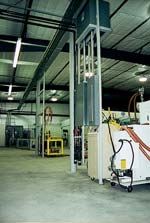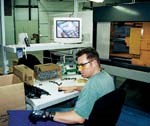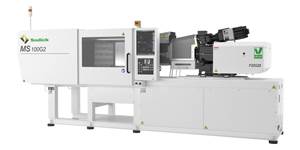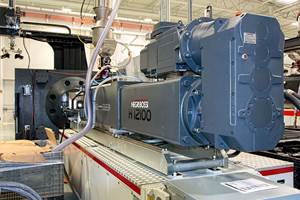A New Plant Is a Blank Slate
The nice thing about a start-up is that you get to start from scratch.
The nice thing about a start-up is that you get to start from scratch. At least that was the case for Robert Wright, hired to be general manager of Legacy Molding Corp., which opened its doors 15 months ago in Riverton, Wyo. He had 19 years' experience in injection molding automotive accessories, consumer products, and medical, electronic, and business machine parts. But at brand-new Legacy Molding, he had the opportunity to design not only business strategy, but every detail of the operation's physical layout.
Legacy was created by Star Tech Corp., a small, family-run firm that makes rollers for exercise treadmills. The firm had been buying custom-molded nylon end caps for its metal rollers, but owners Chuck and Thelma Starks believed they could make them better and cheaper by setting up their own molding operation next door.
They were proved right. Now Rob Wright is starting to build Legacy into a custom molding business that will serve not only local makers of outdoor gear and computer printers but also the nearby Denver and Salt Lake market areas. To compete with established molders, Wright is counting on the lower operating costs in the state of Wyoming and on creating a reputation for quality and precision. That goal is evident in his plant design.
Clean and tidy
Besides tight quality control, a clean plant environment will appeal to medical and electronics customers, Wright believes. Both are reasons why one of his first two machines is an all-electric model, and he plans to buy nothing but electric presses in the future, despite their higher price tags. Electric machines are cleaner and more precise than hydraulic machines, Wright says. They also will cut his energy costs, he believes, and they helped him to save money by downsizing his cooling-tower needs, as well.
Though starting with just two presses of 100 and 200 tons, Wright's floor plan envisions two rows of five machines in the 12,000-sq-ft space. Between each row of machines and the plant wall is room for an aisle to transport materials and parts. Clutter is avoided by combining all electrical, water, air, and materials-transfer piping in a vertical cluster beside each press station. The support structures are already in place at the eight press stations that are now vacant.
Each service cluster has air and water shutoffs. To free up space, the electrical transformer is mounted near the ceiling. Granulators and other auxiliary equipment are mounted on rollers to facilitate mold changes and clean-up of the molding area.
In another space-saving arrangement, pump tanks for the water tower are mounted on a platform against the end wall of the plant, right above the air compressors. Wright's plant also doesn't have any stacks of bags or boxes of materials lying around. His resin distributor delivers daily on a just-in-time basis.
Fully networked
Despite its small size, Legacy Molding makes extensive use of electronic information systems. The molding machines communicate real-time production data via wireless link to a network that reaches all company managers. The ERP system lets operators swipe their ID cards to clock in and out for payroll purposes. They also swipe a barcode reader to clock hours devoted to a particular job.
An unusual feature of the plant is a PC terminal at each press. Operators use it to enter scrap data for later analysis by company managers. Each time the operator measures a part for routine QC, he or she clicks open an SPC program that contains the entire history of that job in one file.
The PC also is loaded with a training video for the current job on the press. It contains precise instructions—e.g., "Start by verifying the part number, which is …." An operator can refer to it whenever he or she wants. "It saves training time," Wright notes.
Related Content
Arburg Open House Emphasizes Turnkey Capabilities
Held at the company’s U.S. headquarters in Rocky Hill, Connecticut, the event featured seven exhibits, including systems that were designed, sourced and built in the U.S.
Read MoreNext-Generation All-Electric and Vertical Injection Molding Machines
Sodick Plustech’s VR-G and MS-G2 Series both utilize the company’s proprietary V-Line technology, separating plasticizing and injection functions, and have upgraded displays, energy efficiency, response time and more.
Read MoreScaling New Heights With Vertical Integration
Eden Manufacturing was founded on a vision of vertical integration, adding advanced injection molding capabilities to a base of precision moldmaking and more recently bringing Swiss-type machining capabilities in-house.
Read MoreWord Games: What’s a ‘Hybrid’?
Any molder will tell you there’s a difference in working with electric vs. hydraulic drives. Servohydraulic is still hydraulic; a hybrid machine is something different. Imprecise use of terms causes needless confusion.
Read MoreRead Next
Lead the Conversation, Change the Conversation
Coverage of single-use plastics can be both misleading and demoralizing. Here are 10 tips for changing the perception of the plastics industry at your company and in your community.
Read MoreSee Recyclers Close the Loop on Trade Show Production Scrap at NPE2024
A collaboration between show organizer PLASTICS, recycler CPR and size reduction experts WEIMA and Conair recovered and recycled all production scrap at NPE2024.
Read MorePeople 4.0 – How to Get Buy-In from Your Staff for Industry 4.0 Systems
Implementing a production monitoring system as the foundation of a ‘smart factory’ is about integrating people with new technology as much as it is about integrating machines and computers. Here are tips from a company that has gone through the process.
Read More
























